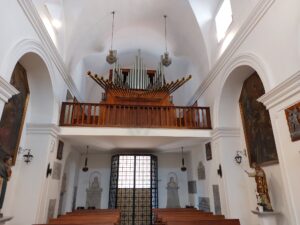I hadn’t sung in St Albans Cathedral in quite a few years, although at one time I did so several years in a row with different choirs. I visited the city three years ago but to rehearse in another church. Returning with the Erleigh Cantors, I noticed quite a few new features such as an extension on the South side (we rehearsed in a large room in the basement of this) and a reconstructed shrine to St Amphibalus.
I’d never sung Weelkes’ Sixth Service before. On arriving at the first rehearsal I was asked to compare the two editions being used, and found they differed in almost every possible respect: pitch, barring, underlay, note values, some variant melody lines and most critically the verse sections. One soprano verse soloist was puzzled that she had been given nothing to do, because she’d been given an edition which set the verses for lower voices only. The reason is that the work is preserved in two sources; they differ and also the verse parts are deficient in both, so there has had to be much editorial reconstruction. Copies of the edition with soprano verse parts were then sourced for everyone. I’ve come across this problem before, most notably when I sang Gibbons’ See, see. the Word is incarnate. I’m always glad to encounter a Tudor verse setting for the first time and there are plenty left that I’ve never done.
The main new piece for me was Howells’ I love all beauteous things which proved a tricky piece to learn, with the characteristic difficulties of late Howells: constant changing of time signature and entries on notes which are far from obvious. It was written for St Alban’s and our congregation included someone who had sung in the first performance.
Other pieces included a revisit of Ronald Corp’s Missa San Marco, Maurice Greene’s substantial setting of O clap your hands, the Walsh responses which we were asked not to do a year ago, Lassus’ Ave verum corpus and the Leighton First Service, which was new to quite a few in the choir
St Albans is not awash with suitable places to stay, but I found a pleasant AirBnB near the Cathedral with a host who regularly accommodated members of visiting choirs (another Erleigh Cantor had booked it independently). Details can be supplied on request. We were also entertained to drinks by the Dean after the Saturday evensong, an act of hospitality that’s now quite rare on Cathedral weekends.





